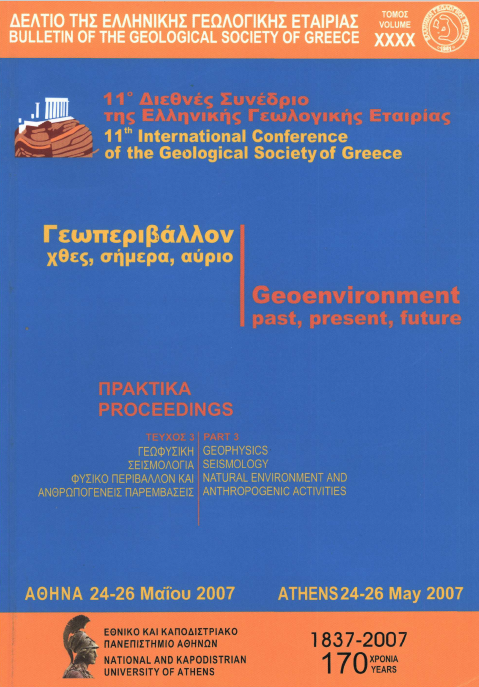First geophysical results in the Archeological sites of Θούρια (Péloponnèse, Hellas) and Sibari-Thurii (southern Italy)

Περίληψη
Οι τεχνικές υψηλής ανάλυσης απόκτησης και επεξεργασίας επιφανειακών γεωφυσικών δεδομένων εφαρμόζονται ολοένα και περισσότερο στην αρχαιολογία. Στην εργασία αυτή, παρουσιάζονται προκαταρκτικά αποτελέσματα από γεωφυσικές αναλύσεις που στοχεύουν στη διερεύνηση υπόγειων αρχαιολογικών ευρημάτων σε δύο επιλεγμένες περιοχές: στη Θουρία (Πελοπόννησος, Ελλάδα) και στην περιοχή Sibari (Νότια Ιταλία). Στην πρώτη περίπτωση η γεωφυσική προσέγγιση περιλαμβάνει τη συνδυαστική εφαρμογή γεωηλεκτρικών και μαγνητικών μεθόδων και μίας καινοτόμου τομογραφικής ανάλυσης για την αντιστροφή των δεδομένων της ειδικής αντίστασης και των μαγνητικών στοιχείων. Στη δεύτερη περίπτωση, πραγματοποιήθηκαν υψηλής ανάλυσης μαγνητικές μετρήσεις, οι οποίες ερμηνεύτηκαν με εφαρμογή των κατάλληλων φίλτρων. Η εφαρμοσμένη αναστροφή των δεδομένων δίνει τη δυνατότητα παραγωγής αξιόπιστων χωρικών μοντέλων και βελτιώνει την ποιότητα των πληροφοριών των γεωφυσικών μεθόδων. Τα αποτελέσματα που προκύπτουν σε αυτό το αρχικό στάδιο της επεξεργασίας επιβεβαιώνουν αρχαιολογικές υποθέσεις σχετικά με ης περιοχές έρευνας, ενώ παράλληλα με τη χρήση των γεωφυσικών μεθόδων επιτυγχάνεται μείωση του χρόνου και των δαπανών κατά την αρχαιολογική έρευνα.
Λεπτομέρειες άρθρου
- Πώς να δημιουργήσετε Αναφορές
-
Di Fiore, B., Chianese, D., Loperte, A., Conte, G., Dibenedetto, A., Vitti, P., Voza, O., & Greco, E. (2007). First geophysical results in the Archeological sites of Θούρια (Péloponnèse, Hellas) and Sibari-Thurii (southern Italy). Δελτίο της Ελληνικής Γεωλογικής Εταιρείας, 40(3), 1080–1090. https://doi.org/10.12681/bgsg.16827
- Ενότητα
- Γεωφυσική και Σεισμολογία

Αυτή η εργασία είναι αδειοδοτημένη υπό το CC Αναφορά Δημιουργού – Μη Εμπορική Χρήση 4.0.
Οι συγγραφείς θα πρέπει να είναι σύμφωνοι με τα παρακάτω: Οι συγγραφείς των άρθρων που δημοσιεύονται στο περιοδικό διατηρούν τα δικαιώματα πνευματικής ιδιοκτησίας επί των άρθρων τους, δίνοντας στο περιοδικό το δικαίωμα της πρώτης δημοσίευσης. Άρθρα που δημοσιεύονται στο περιοδικό διατίθενται με άδεια Creative Commons 4.0 Non Commercial και σύμφωνα με την οποία μπορούν να χρησιμοποιούνται ελεύθερα, με αναφορά στο/στη συγγραφέα και στην πρώτη δημοσίευση για μη κερδοσκοπικούς σκοπούς. Οι συγγραφείς μπορούν να: Μοιραστούν — αντιγράψουν και αναδιανέμουν το υλικό με κάθε μέσο και τρόπο, Προσαρμόσουν — αναμείξουν, τροποποιήσουν και δημιουργήσουν πάνω στο υλικό.


